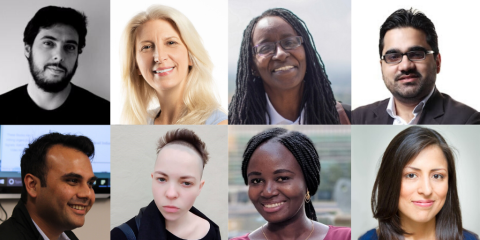
With COVID-19 dominating the news and crippling communities across the world, we at ICFJ are doing everything we can to help journalists provide information that can mean the difference between life and death. I want to highlight how our ICFJ Knight Fellows are leading the way. They are providing resources from webinars with regional experts to journalism safety tips to business strategies to bolster the bottom line.
The Fellows are also active contributors to ICFJ’s Global Health Crisis Reporting Forum, which now has 3,000 members. Peru-based Fellow Fabiola Torres has organized weekly webinars for the Forum with Spanish-speaking health experts, and digital strategists Janine Warner and Nasr ul Hadi teamed up for a media sustainability webinar and will be providing one-on-one mentorship to a smaller group of journalists.
As part of her Fellowship, Fabiola built a network of investigative health journalists in Latin America last year to combat the dangerous and growing problem of health misinformation. Her website, Salud con Lupa (“health under a magnifying glass”), was uniquely positioned to kick into high gear when the novel coronavirus struck. Since then, her Fellowship has supported journalists from eight countries, who are dispelling rumors and producing data-driven coverage of the pandemic.
Other Knight Fellow highlights:
- Janine, whose trailblazing work is strengthening digital media startups in Latin America, is now using her SembraMedia organization to help them find ways to survive the drop in revenues caused by the pandemic.
- Nasr and Ritvvij Parrikh, founders of the PROTO media development organization, launched weekly webinars linking Indian journalists with medical experts and offering advice on innovative health coverage.
- Catherine Gicheru of Kenya is leading regular online mentoring sessions for a network of women journalists in 10 African countries to produce data-driven stories on COVID-19, in partnership with Code for Africa.
Two new Fellows will start projects on combating COVID-19 disinformation:
- Hannah (Ojo) Ajakaiye will collaborate with social media influencers in Nigeria on a new fact-checking project in local languages.
- Data journalism specialist Sérgio Spagnuolo will develop crowdsourcing tools to map cases of disinformation and misinformation about COVID-19 in Brazil, making it easier for news organizations to track it and respond with facts.
In addition, a new ICFJ Knight Fellow Dada Lyndell began work in mid-April with the Sarajevo-based Organized Crime and Corruption Reporting Project (OCCRP), a longtime ICFJ partner. Lyndell, a native of Russia, is an award-winning data journalist who has covered corruption, health, economics and business affairs for one of Russia’s largest independent newsrooms, the RBK Media Group. She will support open-source investigations at OCCRP.
Finally, I am thrilled to announce that Jerri Eddings has become director of the Knight Fellowships Program. Jerri has worked for ICFJ since 2008, with much of that time running our very successful Knight Fellowship projects in Africa. Jerri is a long-time journalist in the United States and Africa, where she covered Nelson Mandela’s election in South Africa, among many other historic events.
The ICFJ Knight Fellowships instill a culture of news innovation and experimentation worldwide. Fellows help journalists and news organizations adopt new technologies to enhance their news gathering, storytelling, editorial workflows, audience engagement and business models. The result: sustainable, trustworthy journalism that serves the public interest. Learn more.